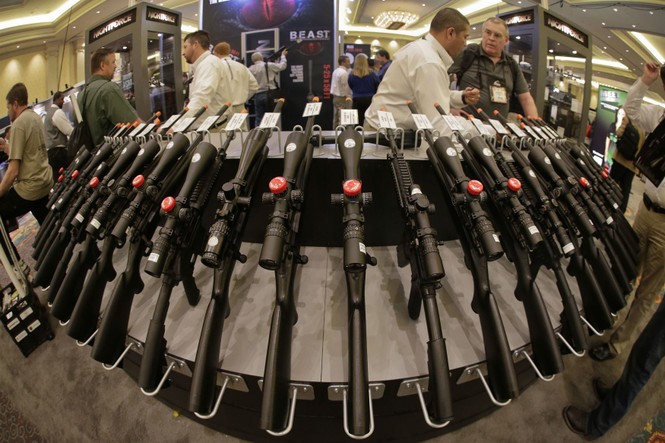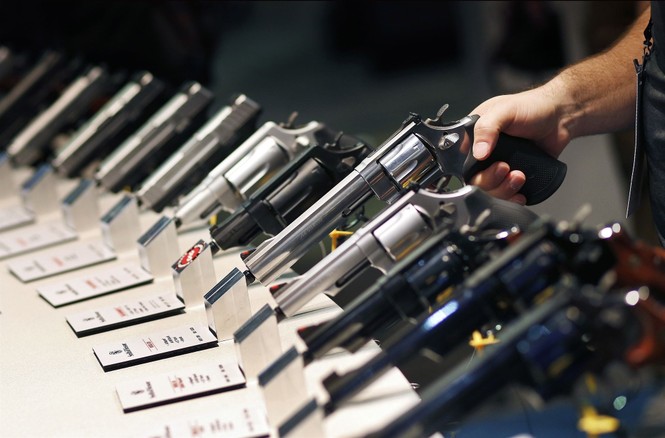VICE News asked Republican pollster Frank Luntz to put together a focus group of current and former National Rifle Association (NRA) members to ask them to discuss the organization as a whole, gun regulations and what can be done to keep children safe in America's schools.
The dynamic and differing opinions that take place between members of the focus group is representative of gun owners across the country, and in particular, those who are strong gun rights activists.

The Struggle for a Solution
While gun control advocates are quick to say gun owners are heartless individuals who only care about keeping their firearms, Luntz's focus group is a prime example of the varying opinions that take place in the gun rights movement.
Gun rights activists struggle to offer solutions for mass shootings because as a collective whole, we all disagree on how to proceed.
"It seems like a problem that instead of being united, we're getting more segregated and apart as far as religion, politics, all different issues, guns, weapons, everything," said bodyguard Tom Muzila.
Muzila is right. We do have political division and discourse in our country. And on the issue of guns, we seem to have more than two sides to this divisive issue.
On one hand, we have gun control advocates who straight up want to ban all firearms. They see guns as a useless tool that do nothing but cause harm and kill people.
Another segment of society has a middle-of-the-road approach to firearms. They understand the importance of the Second Amendment preserving an individual's right to bear arms but they believe America has lax gun laws. They want to see stricter gun regulations without negatively affecting those who want to protect themselves or provide for their family through hunting.
Recommended
There's another portion of gun rights activists who want absolutely zero infringement on the Second Amendment rights. They believe things like background checks infringe on our Constitutional right to bear arms and believe any further regulation goes against their Second Amendment rights.
But guess what? The average American falls somewhere between these three categories. What one person considers an infringement another person considers "common sense" gun regulations.

The Lack of Knowledge
One of the most apparent aspects of Luntz's focus group was the lack of knowledge about gun control laws that are on the books and what firearms are legal.
"I am a member of [the] NRA but I disagree with a lot of the ways that you can get a gun now," said interior designer Phoebe Phaigh. "There needs [sic] to be mental checks. There needs to be-- excuse me-- Why are there machine guns available to civilians?"
Other members of the group were quick to explain to Phaigh that machine guns are not readily available to Americans. The Firearm Owners Protection Act of 1986 banned the sale of new machine guns but allowed people who owned machine guns prior to May 1986 to legally register those firearms. Civilians can transfer those guns via private transfer, depending on state laws. Because of the lack of supply, those that are legal go for a pretty penny.
Phaigh's question, however, brings up one more disturbing point that Second Amendment advocates are frequently talking about: the mainstream media's lack of firearms knowledge, terminology and laws set the average American up for failure.
When general assignment reporters cover mass shootings and they lack a basic understanding of how a firearm works and operates and what's considered an automatic versus a semi-automatic weapon, they inadvertently pass on their misconstrued point of view onto their readers.
People are quick to scream "assault weapon" whenever they see an AR-15 but don't realize that the very same gun would be legal if a simple modification, like the replacement of a grip, was made.
Reporters are quick to say the "AR" in AR-15 stands for "assault rifle" when really it stands for Armalite model 15.
There's also an assumption that if a gun looks a particular way that it must be a fully automatic weapon, when, in reality, the difference between an automatic and semi-automatic firearm is how they function. A semi-automatic weapon requires a trigger pull for each round that is fired. A fully automatic firearm will continually fire rounds with one pull of the trigger.

An Area for Compromise
Luntz's focus group made one thing apparent: there are areas where almost everyone can agree on. We must take those small things we agree on and branch out from there if we ever plan to come to a compromise we can all live with.
One of the things the group seemed to agree upon (for the most part) was that no one knows who is mentally unstable until a person does something to prove that they're not all there.
"You don't know if someone is mentally unstable until they do something," engineer Peter Hurd said.
The other important point that was made: We will never understand why these monsters commit the acts they do because we're not in the same mentally unstable state of mind as they are.
"You can't put a label on all of it, but what you can say is that every single person that aims a gun at another person and pulls a trigger has something--has a screw loose," said mortgage lender Ed Hoffman. "I get as pissed off as anybody does just watching the TV at night. I've got a whole bunch of guns, and you know what? I would never even consider pulling that on someone unless I thought someone was going to kill me or kill someone that I care about."
When Luntz asked the group, "How many of you think we need to step up and enhance background checks?" almost every single hand in the room went up.
Background checks are where we need to begin.
We have the National Instant Criminal Background Check System (NICS) and it's not going anywhere. We need to push our legislators to make sure NICS is as whole as possible. Having background checks in place is practically useless unless every single department in this country is reporting their convictions to the FBI and it's put into the NICS.
As it currently stands, only 38 states report their criminal convictions, and even then, they're not reporting 100 percent of them.
Improving the NICS is a simple solution that people on both sides of the aisle can agree upon. Why are we waiting to push this reform?

























Join the conversation as a VIP Member